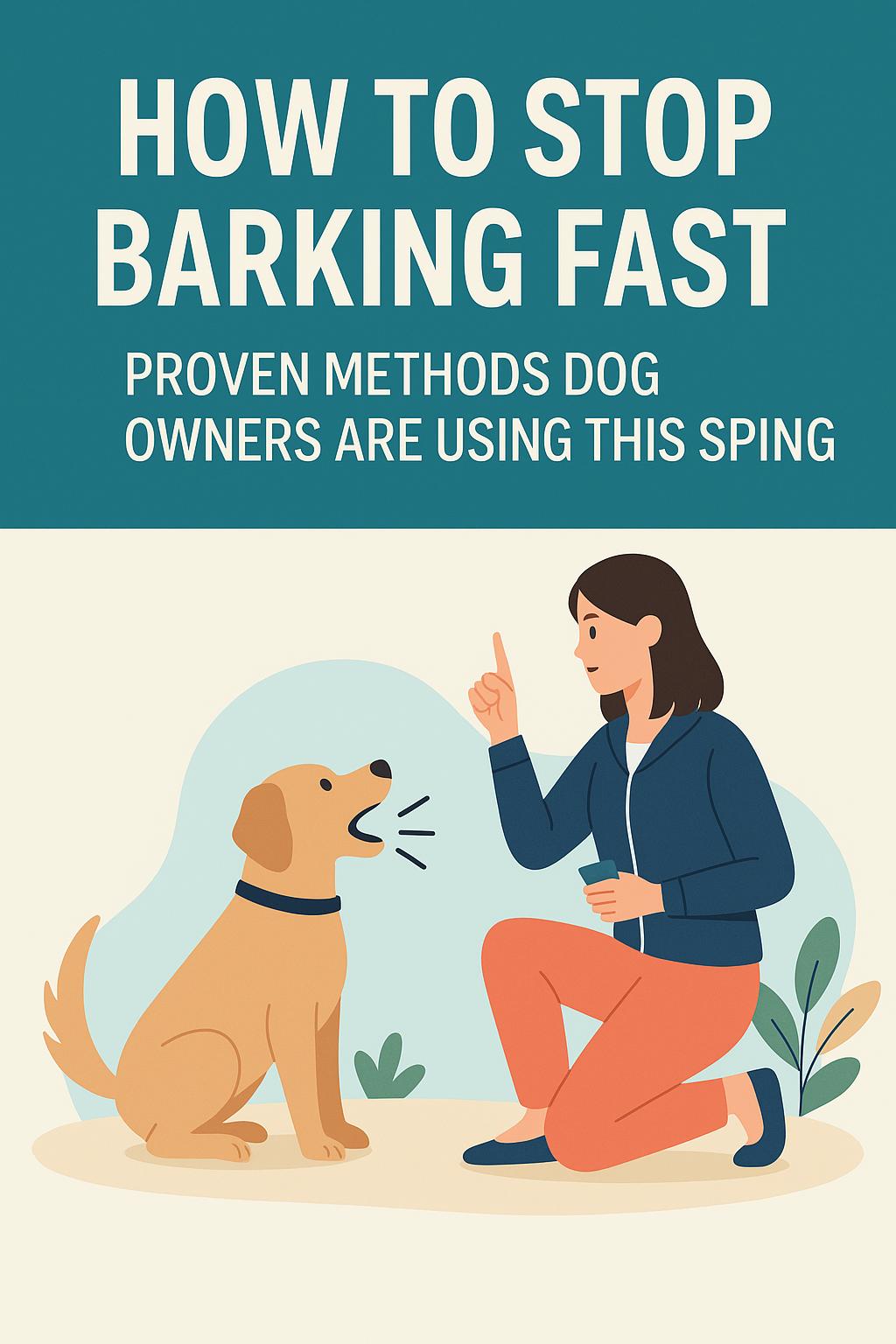
How to Stop Barking Fast: Proven Methods Dog Owners Are Using This Spring
Ah, the sound of a dog barking! It’s the soundtrack to many of our lives, but if you’ve ever found yourself at your wit’s end with a barking dog, you’re not alone. Whether it's constant barking at the door, the mailman, or other dogs, figuring out how to stop barking can be a real challenge for pet parents. But fear not, because we’ve got you covered with some proven methods that dog owners are swearing by this spring to stop the barking fast!
Understanding the Reasons Behind the Barking
Before we dive into how to stop barking, it’s important to understand why your dog is barking in the first place. Dogs bark for a variety of reasons — and figuring out the cause is key to solving the problem. Barking could stem from:
- Attention-seeking behavior
- Fear or anxiety
- Guarding territory
- Excitement
How to Stop Barking Fast: Tips That Work
1. Start with Obedience Training
One of the most effective ways to address barking is through obedience training. A well-trained dog is less likely to bark excessively because they understand boundaries and commands. Puppy training tips like teaching “quiet” or “enough” can work wonders. The key is consistency, so be patient and persistent!
2. Addressing Dog Anxiety: A Key to Calming Barking
Understanding dog anxiety is essential when figuring out how to stop barking. Dogs that bark due to fear or separation anxiety may need extra help to calm down. If your dog’s barking is linked to anxiety, providing a comforting environment or seeking professional help may be necessary.
3. Use Healthy Treats to Reinforce Good Behavior
Dog training doesn’t just involve commands — positive reinforcement goes a long way. Healthy treats for dogs can motivate your dog to stop barking when prompted. Use treats sparingly but effectively, rewarding your pup for quiet behavior or when they respond to your “quiet” command.
4. Redirect Their Attention
If your dog starts barking at something specific, like the mailman or another dog, redirecting their attention can help break the cycle. Try giving them a toy or engage in a quick training session to distract them. This can help them focus on something positive instead of barking at triggers.
5. Socialize Your Dog with Other Pets and People
Sometimes, excessive barking comes from fear or lack of socialization. Puppy care includes proper exposure to different people, pets, and environments. The more confident your dog feels in various situations, the less they’ll bark out of nervousness or fear.
6. Keep Their Minds Busy: Dog Toys and Chews
When a dog gets bored, they often turn to barking to entertain themselves. Best chew toys for aggressive chewers can keep their focus occupied, helping reduce barking caused by frustration. Plus, stimulating toys provide mental exercise, making your dog happier and quieter overall.
7. Create a Calm Environment
Sometimes the barking starts because your dog is overstimulated. Try setting up a calming space with soft bedding, a soothing sound machine, or even some aromatherapy. The goal is to create a peaceful setting that minimizes barking triggers.
Training for Spring: A Time of Renewal
Spring is a great time to start training your dog to stop barking. With the warmer weather, your dog may want to spend more time outside, and you’ll want them to behave while interacting with other pets or people. Use this season as an opportunity to bond and reinforce training!
How to Prevent Barking Before It Starts
As with many things in life, prevention is better than a cure. One of the best ways to avoid constant barking is to prevent situations that might trigger it. Here are a few things you can do:
- Limit exposure to barking triggers, like the doorbell.
- Ensure your dog gets enough exercise to tire them out.
- Offer a variety of mental stimulation activities to keep them engaged.
How Dog Nutrition Plays a Role in Barking Behavior
Believe it or not, what you feed your dog can impact their behavior. Ensuring your dog eats the best dog food for large breeds, filled with the right nutrients, can support their overall health and reduce frustration-based barking. A well-fed dog is a happier, more balanced dog!
Conclusion
Stopping barking fast requires a mix of training, understanding your dog’s needs, and using the right tools. By implementing puppy training tips, addressing anxiety, and using rewards like healthy treats for dogs, you’ll be well on your way to a quieter, more peaceful home. Remember, consistency is key, and with the right approach, you can help your dog stop barking — without losing your mind in the process!
FAQs
What are the best training commands to teach my dog?
The top 10 training commands every dog should know include sit, stay, come, down, leave it, quiet, heel, drop it, off, and no. These basic commands help establish boundaries and can prevent unnecessary barking.
How can I tell if my dog’s barking is due to anxiety?
Signs your dog may have anxiety include excessive barking, destructive behavior, and signs of distress when left alone. Addressing separation anxiety with training and a calming environment can help reduce barking in these cases.
What should I do if my dog is barking excessively at strangers?
If your dog barks at strangers, start by working on socialization. Introduce your dog to new people gradually, rewarding them for calm behavior. Over time, they will learn to stay quiet around strangers.
Can dog toys help with barking?
Yes! Providing engaging dog toys, like chew toys for aggressive chewers or puzzle toys, can keep your dog’s mind occupied and help prevent boredom-related barking.
Should I seek professional help for my dog’s barking?
If you’ve tried various methods and your dog’s barking continues to be an issue, it may be time to consult a dog trainer or behaviorist. They can assess the situation and offer tailored solutions for your dog’s unique needs.